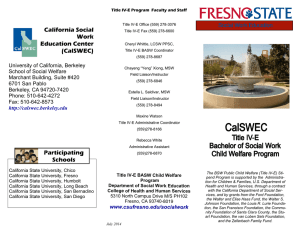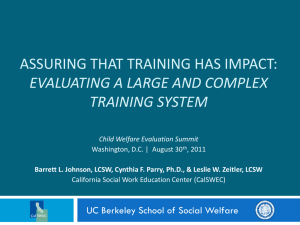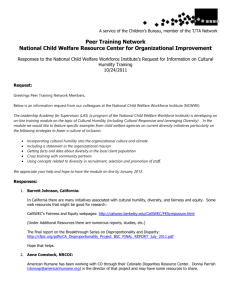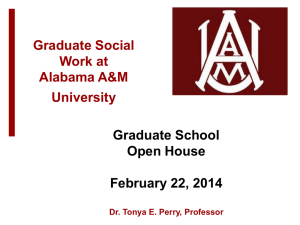Document 13091789
advertisement
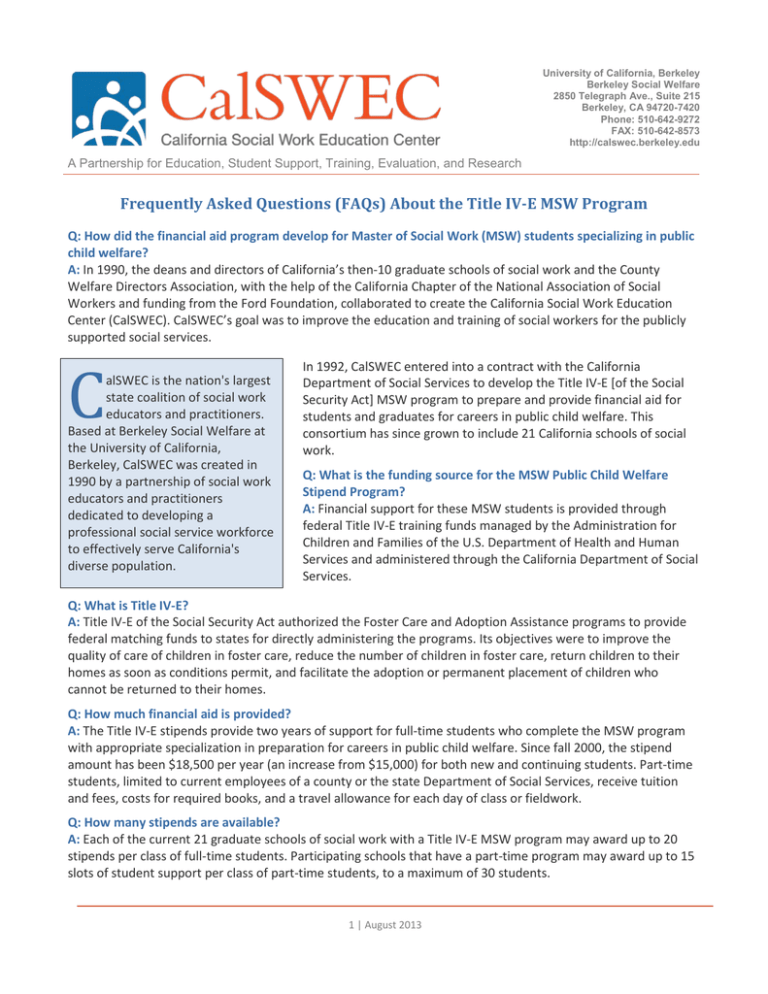
University of California, Berkeley Berkeley Social Welfare 2850 Telegraph Ave., Suite 215 Berkeley, CA 94720-7420 Phone: 510-642-9272 FAX: 510-642-8573 http://calswec.berkeley.edu A Partnership for Education, Student Support, Training, Evaluation, and Research Frequently Asked Questions (FAQs) About the Title IV-E MSW Program Q: How did the financial aid program develop for Master of Social Work (MSW) students specializing in public child welfare? A: In 1990, the deans and directors of California’s then-10 graduate schools of social work and the County Welfare Directors Association, with the help of the California Chapter of the National Association of Social Workers and funding from the Ford Foundation, collaborated to create the California Social Work Education Center (CalSWEC). CalSWEC’s goal was to improve the education and training of social workers for the publicly supported social services. C alSWEC is the nation's largest state coalition of social work educators and practitioners. Based at Berkeley Social Welfare at the University of California, Berkeley, CalSWEC was created in 1990 by a partnership of social work educators and practitioners dedicated to developing a professional social service workforce to effectively serve California's diverse population. In 1992, CalSWEC entered into a contract with the California Department of Social Services to develop the Title IV-E [of the Social Security Act] MSW program to prepare and provide financial aid for students and graduates for careers in public child welfare. This consortium has since grown to include 21 California schools of social work. Q: What is the funding source for the MSW Public Child Welfare Stipend Program? A: Financial support for these MSW students is provided through federal Title IV-E training funds managed by the Administration for Children and Families of the U.S. Department of Health and Human Services and administered through the California Department of Social Services. Q: What is Title IV-E? A: Title IV-E of the Social Security Act authorized the Foster Care and Adoption Assistance programs to provide federal matching funds to states for directly administering the programs. Its objectives were to improve the quality of care of children in foster care, reduce the number of children in foster care, return children to their homes as soon as conditions permit, and facilitate the adoption or permanent placement of children who cannot be returned to their homes. Q: How much financial aid is provided? A: The Title IV-E stipends provide two years of support for full-time students who complete the MSW program with appropriate specialization in preparation for careers in public child welfare. Since fall 2000, the stipend amount has been $18,500 per year (an increase from $15,000) for both new and continuing students. Part-time students, limited to current employees of a county or the state Department of Social Services, receive tuition and fees, costs for required books, and a travel allowance for each day of class or fieldwork. Q: How many stipends are available? A: Each of the current 21 graduate schools of social work with a Title IV-E MSW program may award up to 20 stipends per class of full-time students. Participating schools that have a part-time program may award up to 15 slots of student support per class of part-time students, to a maximum of 30 students. 1 | August 2013 Q: How do full-time students qualify for financial support in the Title IV-E MSW program? A: Students must be enrolled full time at a California graduate school of social work participating in the Title IV-E MSW program. Current employees of county Departments of Social Services are given admission preference, but they must be on educational leave (i.e., not receiving pay from the agency during the academic year). The employees may work during break periods and summers and may perform fieldwork in their agency subject to school policies. Stipend recipients must agree to participate in the complete child welfare specialization as defined by the school, have a valid driver’s license and secure use of a car as required for fieldwork, and undergo pre-screening for county employment. They must also fulfill a work commitment upon graduation. Q: How do part-time students qualify for financial aid in the Title IV-E MSW program? A: Students must first be admitted to an accredited California graduate school of social work. Admittance to part-time study is limited to current employees of county Departments of Social Services or public child welfare services agencies or the California Department of Social Services. Applicants must have a letter of support from his or her agency director. Support recipients must agree to participate in the complete child welfare specialization as defined by the school, have a valid driver’s license and secure use of a car as required for fieldwork, and undergo pre-screening for county employment. They must also fulfill a work commitment upon graduation. Q: Which schools participate in the Title IV-E MSW program? A: Currently California’s 21 accredited graduate schools of social work and social welfare participate in the program. To see the most current list of schools, go to http://calswec.berkeley.edu/schools-social-worksocialwelfare. Q: How are students selected to receive the financial aid? A: Students apply to individual schools and must meet usual admissions requirements. Admitted students may apply for the Title IV-E financial aid by completing an application form. At each school an awards committee, consisting of both faculty/administration and agency representatives from county child welfare services, makes award decisions. Priority is given to current county and state Department of Social Services employees and applicants who reflect the diverse client populations currently served by child welfare agencies in California. Q: What academic requirements must students fulfill to receive the financial aid? A: Students must complete the entire MSW child welfare program at their school, including the equivalent of two years of fieldwork. One year of fieldwork must be in a county child welfare agency serving Title IV-E children and families. An additional year may be completed in a related county or non-profit program serving child welfare (Title IV-E) clients, i.e., children in or at risk of out-of-home placement. Q: What is the student’s work commitment after graduation? A: Upon graduation, full-or part-time students must work in a county child welfare services agency or California Department of Social Services (CDSS) child welfare division for a period of two years. A student who is employed in a county or the state Department of Social Services must return to that agency and render two years of continuous and satisfactory full-time employment at a level appropriate to a new MSW in public child welfare. If a position meeting these requirements is not available in the agency to which service is owed, the student must apply for and accept an equivalent or higher position in a county child welfare service within a 75-mile radius of the student’s residence. If this is not available, the student must search, apply for, and accept an MSW equivalent or higher position in any California county child welfare services agency or the California Department of Social Services. A student who is not a current employee must apply for and accept a position appropriate to a new MSW in a public child welfare agency within a 75-mile radius of the student’s residence. If no position is available within 75 miles, the student must search, apply for, and accept an MSW-level position in any California county child welfare services agency or the California Department of Social Services. 2 | August 2013 Q: What options are available in working with Native American children and families to satisfy the work commitment? A: Native American and non-Native American graduates may complete their work commitment in the following settings as alternatives to California child welfare services: • a reservation or rancheria providing child welfare services in California, • an urban Indian agency in California serving Title IV-E eligible children and families, or • a reservation providing child welfare services in another state. Q: What is the role of participating counties in the stipend program? A: Participating counties develop educational leave policies, publicize the program, agree to re-employ trainees as long as jobs are available, provide quality fieldwork with MSW supervision in accordance with school requirements, seek to schedule hiring procedures to fit graduate employment time restrictions, and seek to give hiring preference to graduates. County directors serve on the CalSWEC Board of Directors. Q : How should interested persons obtain more information about applying for admission to a participating school? A: They should contact the school they are interested in directly. The most current list of schools is available at http://calswec.berkeley.edu/schools-social-worksocial-welfare. Q: How should interested persons obtain answers to other questions about the Title IV-E MSW stipend program? A: They should first contact the graduate school in their area and the Title IV-E MS Project at the school. If they are unsure of which school that is, they should contact: California Social Work Education Center (CalSWEC) University of California, Berkeley Berkeley Social Welfare 2850 Telegraph Ave., Suite 215 Berkeley, CA 94705-1169 Phone: 510-642-9272 FAX: 510-642-8573 Interested persons can also visit the Title IV-E Child Welfare Training Program, http://calswec.berkeley.edu/titleiv-e-child-welfare-training-program, on CalSWEC’s website, http://calswec.berkeley.edu/. 3 | August 2013
